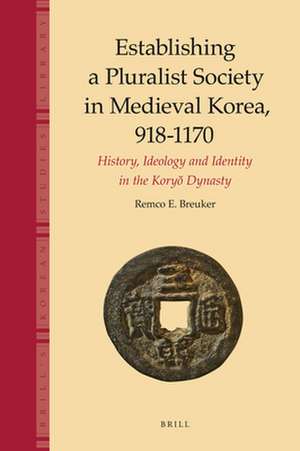Establishing a Pluralist Society in Medieval Korea, 918-1170: History, Ideology, and Identity in the Koryŏ Dynasty: Brill's Korean Studies Library, cartea 1
Autor Remco Breukeren Limba Engleză Hardback – 24 mar 2010
Here is a convincing argument that Koryŏ’s pluralism decisively contributed to the formation of a region-transcending communal identity that enabled Koryŏ to engage in a civilizational competition with neighbouring Chinese and Manchurian states, while maintaining a dynamic but stable society domestically.
Preț: 1071.71 lei
Preț vechi: 1306.97 lei
-18% Nou
Puncte Express: 1608
Preț estimativ în valută:
205.06€ • 214.13$ • 169.34£
205.06€ • 214.13$ • 169.34£
Carte indisponibilă temporar
Doresc să fiu notificat când acest titlu va fi disponibil:
Se trimite...
Preluare comenzi: 021 569.72.76
Specificații
ISBN-13: 9789004183254
ISBN-10: 9004183256
Pagini: 484
Dimensiuni: 155 x 235 x 38 mm
Greutate: 0.84 kg
Editura: Brill
Colecția Brill
Seria Brill's Korean Studies Library
ISBN-10: 9004183256
Pagini: 484
Dimensiuni: 155 x 235 x 38 mm
Greutate: 0.84 kg
Editura: Brill
Colecția Brill
Seria Brill's Korean Studies Library
Notă biografică
Remco E. Breuker, Ph.D. (2006) in Korean History, Leiden University, works on medieval Korean and Northeast Asian history and historiography. He has published extensively on Koryŏ history including Forging the Truth: Creative Deception and National Identity in Medieval Korea (2009).
Recenzii
'The importance of this outstanding work goes well beyond reshaping our understanding of Koryŏ. Indeed, Koryŏ’s way of understanding and living within the world as analyzed by Breuker would become an object of fear during the subsequent Chosŏn (1392-1910) dynasty. Those fears—and the way they came to be expressed—provide much additional evidence for Breuker’s thesis on Koryŏ’s pluralism. They also point to a profound historical irony. In the minds of the Chosŏn elite, Myoch’ŏng was synonymous with political disorder. Yet in a fundamental sense, the Chosŏn elite’s outlook had far more in common with Myoch’ŏng’s monism than with Kim Pusik’s pluralism. Among many other things, Breuker illuminates the origins of that remarkable contradiction.'
Gregory Evon, University of New South Wales, The Review of Korean Studies 16:2 (2013)
Gregory Evon, University of New South Wales, The Review of Korean Studies 16:2 (2013)





